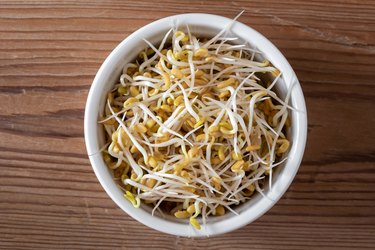
Sprouts — alfalfa, lentil, pea, fenugreek, etc. — have a nutritional advantage, as the sprouting process enhances their nutritional content and digestibility. Fenugreek seeds, which are actually legumes, sprout when they're soaked in warm water.
They make a nutritious addition to salads, soups and other meals. A typical serving is 1 to 2 cups depending on the meal. Fenugreek sprouts contain various nutrients but are particularly rich in fiber, protein and iron. One teaspoon of fenugreek contains:
Video of the Day
Video of the Day
- Calories: 12
- Fat: 0 grams
- Carbohydrates: 2 grams
- Fiber: 1 gram
- Protein: 1 gram
High in Fiber
The sprouting process significantly increases the fiber content of sprouts, according to the book Sprouts: The Miracle Food. And a 1-cup serving of fenugreek sprouts contains about 6 grams of fiber. This is important, as most Americans don't eat enough fiber, a nutrient crucial to good health.
Eating a fiber-rich diet lowers blood pressure and cholesterol, promotes healthy blood sugar and boosts weight loss, according to a review published in the April 2009 issue of the journal Nutrition Reviews. Aim to get 14 grams of fiber per 1,000 calories.
Rich in Iron
Fenugreek sprouts contain various minerals, but the standout is the iron content. A 1-cup serving provides about 8 milligrams of iron, according to the book Sprouts. The recommended daily intake is between 8 and 18 milligrams, according to the Office of Dietary Supplements.
Iron helps carry oxygen in your red blood cells as a crucial component of the protein hemoglobin. While animal-derived iron is more readily absorbed, fenugreek seeds contain enzymes and vitamin C that enhance plant iron absorption.
High-Quality Protein
Fenugreek sprouts are rich in high-quality, plant-based protein. This is a good source if you're following a vegan diet, which typically contains less than the recommended intake of protein. Fenugreek sprouts are comprised of about 30-percent protein, according to Sprouts.
Everyone, vegan or omnivore, needs protein. It's an essential structural component of hair and nails, and is used to build and maintain skin, muscles, cartilage and strong bones. Proteins also play a role in producing hormones and enzymes.
Eating Sprouts Safely
Eating sprouts carries the risk of infection from harmful bacteria like E. coli and salmonella, according to the Centers for Disease and Prevention (CDC). The risk is higher with sprouts compared to other produce because the warm conditions needed for sprouting promote bacteria growth.
When you buy sprouts, refrigerate them immediately and throw them out if they become slimy or otherwise rotten. Wash your hands before handling and rinse sprouts thoroughly prior to eating. If you choose to sprout your own fenugreek, purchase seeds specifically designated for home sprouting as they are subject to more rigorous testing protocols.
Don't eat sprouts if you have a weak immune system or are pregnant. Cooking sprouts reduces the risk of food poisoning, notes the CDC.